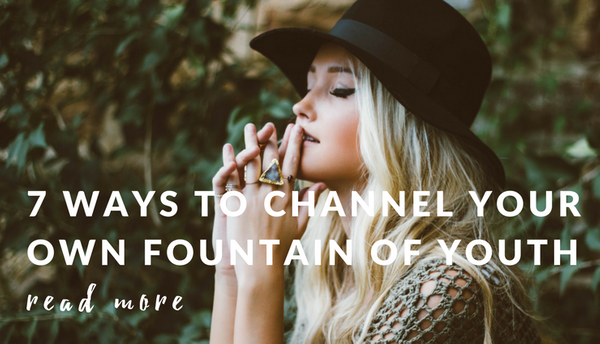Imagine if we all loved our bodies and our flaws as much as we wish we could fix them or compare ourselves to others. What a beautiful place the world would be if we just appreciated our bodies as temples and our flaws as motivation or beauty marks. What a beautiful feeling we'd fill our hearts and our souls with if we replaced our negative thinking with gratitude and grace on ourselves. Age is just a number; age is a work of art.
"Beauty is in the way you hold yourself. It's how you treat people. The way you love. It's self acceptance. Beauty is in your soul...true beauty begins inside." -Unknown.
However, there are still a few things you can do to help minimize external and internal signs of aging, because, at the end of the day, we all feel our best and happiest selves when we feel confident in our own skin. Enjoy these 7 ways to channel your own inner fountain of youth shared by Michael Pritsker, the owner of Happy Head Foot Reflexology and Massage, located in oh-so-sunny San Diego, California.
- Limit Sun Exposure – It’s not exactly a revelation that sun exposure can lead to wrinkles, skin damage, and age spots, to name a few, but you may be surprised to learn that it has proven to be responsible for 80% of visible facial aging signs (Journal of Clinical, Cosmetic and Investigational Dermatology, 2013). It can be difficult to stay out of the sun when you live in sunny areas, but consider wearing a hat when working out outdoors, keep sunscreen in your car, in your stroller, or in your purse; use a daily moisturizer with SPF, bring an umbrella to the beach, and be mindful of your sun exposure while driving, playing outside with your littles, or throughout your work day if you spend any of it outside.
- Load up on Leafies– Green leafy vegetables are high in vitamins C and E, which have both been shown to have a protective effect against photoaging (American College of Nutrition, 2001). You know that trending kale or collards green recipe you've been pinning for months now? Give it a try!
- Get Your Finances in Order – This one may seem like it’s totally out of left field in the aging game, but one study showed that financial stress may actually make you look older (Research on Aging, 2016). If you're in financial stress, first, breathe. You're not alone. Consider hiring a financial planner to help go over your finances. You can also treat yourself to a mama day; book a facial or massage as a natural way to get rid of stress. A study showed that a 45-minute facial massage can significantly change anxiety and mood (Biomed Research, 2008).
- Moisturize in Winter Months – Cold, dry air can cause the skin to dehydrate and crack, which can instantly cause sensitive skin to be uncomfortable, but it can also lead to premature aging. To keep the moisture in your skin, try using a humectant, such as glycerin or lactic acid to attract water and help the skin retain its moisture. If you want that young, dewy glow, you’ll need to moisturize allllllll year long [not just the winter when it may seem more obvious!]
- Exercise for Life – A study that followed recreational cyclers found that those who were most active did not show their age as much as those who were inactive (Journal of Physiology, 2015). We all know that regular excerise can boost mood, muscle toning, energy, and help ward off illesses, so now is the time to commit to Y O U. Join a local FIT4MOM class in your area; find one by visiting FIT4MOM.com
- Meditate – One of the best ways to channel your inner-youth is to keep your brain healthy. Research shows that meditation can shave as many as seven and one-half years off your brain’s perceived age (NeuroImage, 2016). It’s time to say goodbye to that brain fog that is so often associated with motherhood, and say hello to getting in the habit of meditating.
- Avoid sugar – A study found that sugar causes your body to produce molecules that can age your skin by attacking collagen and elastin. These same molecules also attack free radicals that protect your skin from sun damage (DermatoEndocrinology, 2012). By cutting out sugar, or at least radically reducing it, you can help your body on the inside and on the outside...who knew?!
Some moms seem to have a fountain of youth in their back pockets, with perfect skin and hair and seem to never age. But armed with these seven simple lifestyle changes, you can become one of those mamas. Every day and every little change adds up, so don't forget to nourish yourself and add these tips + tricks to your daily lifestyle!
This post was originally written by Michael Pritsker and edited by FIT4MOM to match our voice of modern motherhood storytelling.


